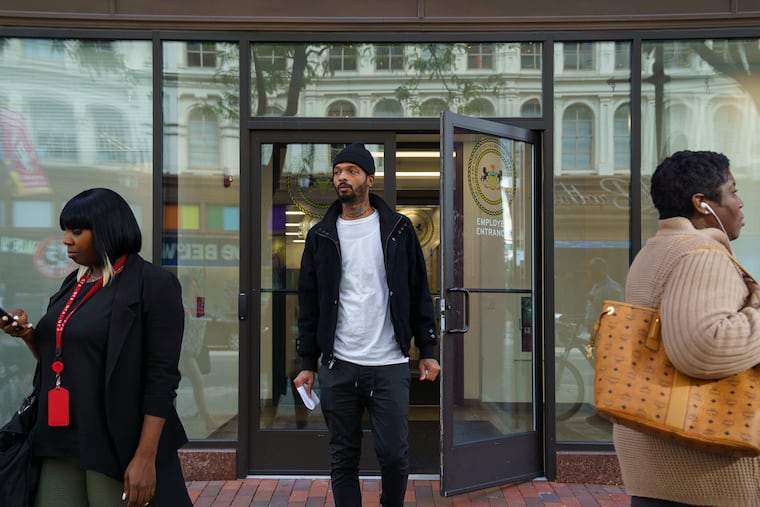Can a change of address land you in state prison? If you’re on parole in Pennsylvania, it can.
Pennsylvania has the nation's second-biggest population in prison, or on probation and parole. That’s not only expensive, critics say, but creates a dire cycle of mass incarceration.

In Pennsylvania, the number of people in prison, on probation, or on parole has ballooned to five times what is was in 1980, even as crime rates have fallen. The state now has the second-highest rate of correctional control in the country. That’s not only expensive, critics say, but counterproductive, landing many parolees right back in prison while piling up impossible caseloads for those supervising them.
Based on Pennsylvania’s outlier status, a new report from Human Rights Watch and the American Civil Liberties Union singles out the state’s system for scrutiny. For the first time, it pulls back the curtain on exactly how state parole violations, which are processed by the state parole board out of public view, are driving the prison population. The most common reason for violating parole? Moving without notifying your parole officer.
The report’s author, Allison Frankel, spoke with The Inquirer about the findings — and how reforms could break this cycle. The interview has been edited for length and clarity.
Why single out Pennsylvania for scrutiny?
What makes Pennsylvania stand out is, it has incredibly high numbers of people under supervision — one of every 35 people in the state is under probation or parole, and extraordinarily high numbers of people are going back into state prisons as a result of supervision violations. Well over half of people going into state prisons in Pennsylvania are going there because they violated the rules of their supervision. and we noticed really marked racial disparities in the criminal-legal system. And the sentencing laws there are completely out of whack compared to many other states. Because there are no limits on how long your probation can be extended, people can be serving probation easily for decades.
» READ MORE: How probation in Pennsylvania often makes people more desperate — and lands them in jail
You got access to Pennsylvania Parole Board data for this analysis. What did you find out?
There’s been a lot of talk about how supervision is driving mass incarceration and talk about how Pennsylvania is a leader in that — but it’s really been a black box in terms of what is driving all those people back to state prison. And our report is the first to lay out what are the underlying rule violations that are sending so many people back — and through our interviews, what are the factors in people’s lives that are serving as a tripwire back to incarceration.
It was really jarring. Changing your residence without alerting your parole officer was the single most common parole condition that led to violation proceedings, accounting for a full third of them. This is really problematic because it goes back to the lack of resources. Many people we are talking to lack housing stability — they are moving from a park bench to an abandoned building to a friend’s couch — and they are supposed to let their parole officer know every time they move. They’re worried about having food to eat, a safe place to stay. It’s a burdensome condition that is completely unrelated to the underlying conduct that got them on parole in the first place. Instead of spending all these resources tracking people down and locking them for up moving without permission, we could be focusing those resources on helping them get housing.
You researched several states. What surprised you about Pennsylvania in particular?
One of the things that was really horrifying was just the conditions in which so many people are confined. Another was the massive racial disparity. I spoke with multiple Black and brown men in Philadelphia who said they’re not allowed to associate with anyone with a criminal record — but they live in a community that is heavily policed, where everyone has a criminal record. The immense anxiety, the mental toll and trauma of being under supervision as a Black and brown person, particularly in a neighborhood that is heavily policed, that weight is enormous and is in itself a punishment.
So what reforms do you think could change this?
Our report lays out a lot of detailed recommendations that people at every layer of government can take. But there are three key things we can do in Pennsylvania. One, we need to divest away from parole, probation and incarceration, and invest in jobs, housing, and voluntary, community-based substance-abuse treatment and mental-health services. Two, we need to reduce the number of supervision sentences we impose, and to look at alternatives like community service requirements or unconditional discharge. And lastly, when supervision terms are imposed, we need to dramatically shorten the length of supervision terms, reduce the number of conditions, as many conditions are not based on a person’s needs, goals or risks. Then, we need to severely limit the consequences for violating those conditions. We think all of these reforms would go a really long way to breaking the supervision-to-incarceration pipeline and helping people get the resources they need to succeed.